BAROQUE AND LOVING IT
It begins innocently enough with two nymphs singing, swinging and blowing bubbles—until the gods intervene and mayhem ensues. There are transvestites, lusty satyrs, and phalluses galore. There is a blonde bimbo, an ice queen, and a goddess scorned. There is mischief, ribaldry, cuckoldry, tomfoolery, and slapstick. Underscoring it all are Francesco Cavalli’s musical scorings and Giovanni Faustini’s libretto. They named it La Calisto and brought it to life in Venice as early as 1651.
La Calisto languished in obscurity for more than three centuries until Glyndebourne Opera successfully revived it in 1970. Following the publication of a more accurate edition of Cavalli’s original manuscript in 2008, the opera has continued to find and enchant new audiences. Pacific Opera Project’s production provides La Calisto’s Los Angeles premiere—and none too soon. It also marks the young company’s first—but hopefully not last—foray into early music.
Conductor Stephen Karr leads an authentic baroque ensemble from the harpsichord that includes recorders, viols, and a theorbo. This provides an interesting contrast to Maggie Green’s often glittery and garish costumes, from Giove’s superhero chic to the nymphs’ diaphanous dresses. And in a welcome return to the crude and edgy humor that marked POP’s early successes, Artistic Director Josh Shaw has used slangy supertitles, flushing toilets, and toy guns to considerable comic effect. Moreover, his playground set comes replete with swings, teeter-totter, merry-go-round, slide, and ball pit à la Chuck E. Cheese’s.
La Calisto centers on two romances. The first involves Giove (Ryan Thorn) and Calisto (Claire Averil), the second Diana (Sarah Beaty) and Endimione (Bryan Pollock). Giove desires the titular nymph Calisto, a chaste follower of Diana. In order to seduce her, Mercurio (Adrian Rosales) urges Giove to take the form of Diana. Ignoring Pane’s (E. Scott Levin) flirtations, Diana falls for the human Endimione. Diana is understandably livid when she discovers what Giove has done. Meanwhile, Giove receives the unwelcome advances of Endimione, who mistakes the god for his beloved Diana. Filling out the sprawling cast are Giove’s wife Giunone (Daria Somers), Satirino (Patrick Dailey), Linfea (Joseph von Buhler), Sylvano (Phil Meyer), Natura (Monica Alfredsen), Destino (Emma-Grace Dunbar) and Eternita (Amy Lawrence), as well as chorus of nymphs and satyrs.
Among this whole array of operatic talent, Thorn and Somers deserve to be singled out. Thorn hilariously hams it up as Giove, setting the tone for La Calisto from start to finish. His versatile voice is almost equally at home in the falsetto he adopts for his Diana disguise as for the commanding baritone he wields so effortlessly as king of the gods. Far more than Averil as Calisto, Thorn is the musical and dramatic anchor of the production. Although Somers’ soprano role is small, she gives one of her finest POP performances yet as Giove’s wife Giunone. In the aria “Dalle gelose mie,” Somers expresses Giunone’s regal rage with an extraordinary vocal maturity and richness of texture.
As Calisto, Averil strikes just the right balance between bewitching beauty and blonde bimbo. Gifted with a delightfully clear and strong voice, she sings a little sharp at times and appears to lack the technique necessary for the baroque opera’s more florid passages. Countertenors are so seldom heard these days that it is a real treat to have two in this production: Pollock and Dailey, both of whom have gorgeous voices. Despite going flat, Pollock’s duet with Beaty at the beginning of Act Two was one of the opera’s most moving and magical moments. As the ice queen Diana, Beaty’s acting is suitably stiff and serious, though her voice doesn’t quite match her gestures in power. She does, however, seem far more at home in the baroque style than most members of the cast.
La Calisto ends with a rousing and celebratory chorus that could only have been written by someone who had spent his whole life singing and performing at the Basilica of San Marco in Venice. That heritage of early music, which Cavalli so splendidly embodies, deserves to be more widely heard. Pacific Opera Project has compellingly shown that baroque opera still has the power to enthrall and captivate audiences. What will this exciting company do next?
La Calisto
Pacific Opera Project
Highland Park Ebell Club
131 S. Avenue 57
scheduled to end on May 10, 2014
for tickets, call (323) 739-6122
or visit www.PacificOperaProject.com
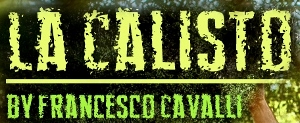
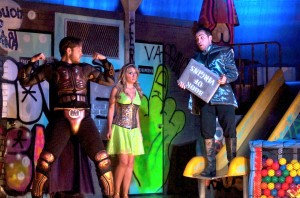
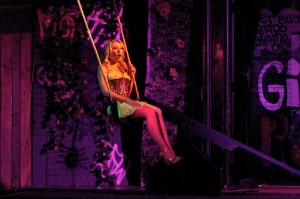
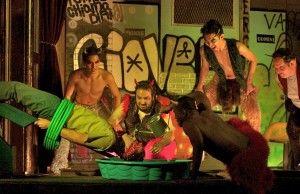
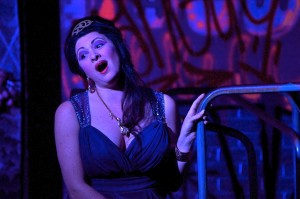
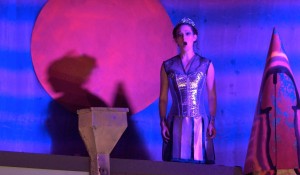
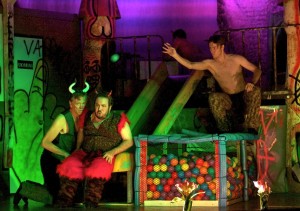
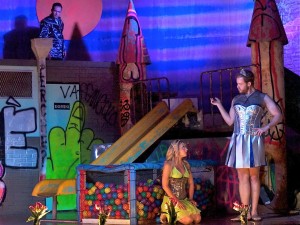
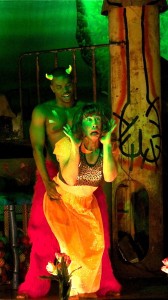

{ 1 comment… read it below or add one }
Outstanding review – captures the wit and majesty of the entertainment exceedingly well!